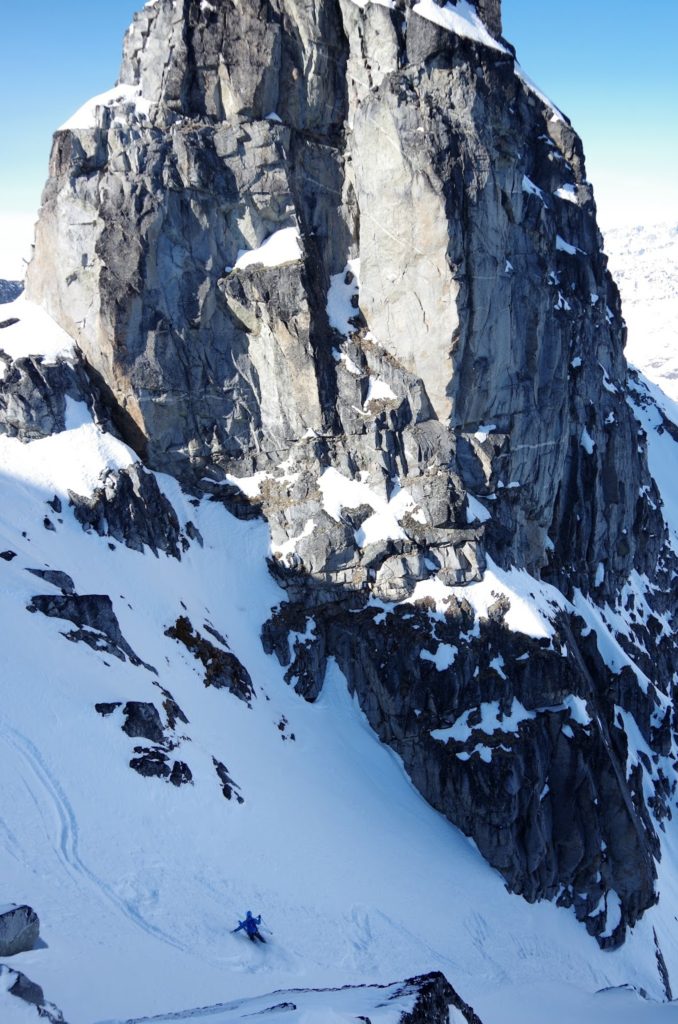It is the summer of 1982, which makes me twenty-two, and not for the first time that summer I am afraid that I might die in about the next two seconds. The source of this fear is my participation in an Intermediate Mountaineering class through Anchorage Community College. At this moment, we are coming down Montana Peak, accurately described by some as a “big pile of rotten rock.” As per usual, the instructor is ignoring us, and we are all picking our own way down various routes without benefit of safety equipment. I’m on a long, steep ice chute, kicking steps while facing inward, carefully placing my ice ax each time I take a step.
“Falling!” somebody screams. I look up, and see a woman hurtling toward me, bouncing and rolling, flopping around as if unconscious, and the only thing I can think of is to get out of the way. I move to the edge of the chute as quickly as I can and watch while she hurtles by me and comes to rest precariously on a steep rock slope. Had she kept going past that point, she would have been bouncing and rolling for quite a while.
I did not get the rush of adrenalin that some of my companions did; I did not join those who were bounding down the slope to her aid. I froze. Everything slowed down to a crawl, and it was all I could do to start moving slowly in her direction. For many years I looked back on that moment with feelings of guilt and inadequacy, with these feelings being reinforced by the memory of another climber shouting at me to hurry up and get down there. I wonder, though, if I really did wrong. If I had stayed where I was originally, she would have crashed into me, and we would both have fallen who knows how far. If I had rushed down the slope, I might have slipped and landed on top of her, thus taking us both the rest of the way down. But whether I was right or wrong is a moot point because at the very moment I was out of the way of her fall, my animal brain proceeded to hack my nervous system. My reflexes slowed to a crawl. I thought in a disassociated way that I should head down that slope, but my muscles did not respond. It was a little bit like trying to run while dreaming.
I later redeemed myself in my fellow climber’s eyes by waiting with the injured woman through the night for a helicopter to pick her up, listening to her wail and cry in semi-delirium, and trying to keep her comfortable and calm. Being uninjured allowed me to step in as a caregiver when one was needed. Some, I guess, jump into the breach while others wait for the dust to settle before stepping in. I think maybe humanity needs both kinds of people.

*************************************************************
For your further edification:
Picture source: Mountain memories: Montana Peak – 4.7.2018 (mikerecords.com)
Wow, what a story! Bob and I also took a moumtaineering class in Anchorage….curious who your instructor was.
Yes, I believe the world does indeed need both kinds of people!
Thank you, Linda! As my father used to say, “It takes all kinds (to make the world).”
Thanks, Carol. Ah, the days of mountaineering!
All of us have memories where we think we should have reacted differently. Nothing in your story, Evelyn, makes me think you should have done something better than what you did. The person rushing down the slope screaming at you was in a panic, and reminds me of a true story where a person on one side of a busy road dashed across the road to help someone hit by a car, and got hit himself. From a physics point of view, had you been hit by the tumbling woman, your added mass would probably have taken both of you over the edge, and I think the practical part of your brain knew that.
There were plenty of people there to apply immediate first aid; the more difficult part was the part you played, taking care of the injured woman through the night.
Remembering my days as an EMT, I usually stop to help at an accident, but the last car accident I saw
I turned my back on and drove away. I saw that others were responding, and knew that I was needed more elsewhere at the time.
Thanks! I seem to recall a quote from one of the many first responders’ classes that we took: the most important thing to remember when you are helping someone is to not become a casualty yourself. True that.
Or, First, do no harm.
To sum up, don’t get yourself killed, and don’t make matters worse!
There are lots of layers and lessons in that story. I had a friend die during a mountaineering class out of UA in the late 1980s. I wasn’t in the class, but I have imagined the scene many times. My personal crises have been in the context of boating and being rescued. The sense of being at fault or being responsible for the rescue is powerfully imprinted on my psyche. In my case my behavior was analyzed by “experts” and so I have their conclusions, not so different from my own, to incorporate into my self talk. There are so many variables in the “what might have happened if” arena that I just accept the event as is.
Thank you, Terry, I always appreciate your comments. I did not know about the death, that’s rough. I agree, we need to accept situations like these, and move on from there.